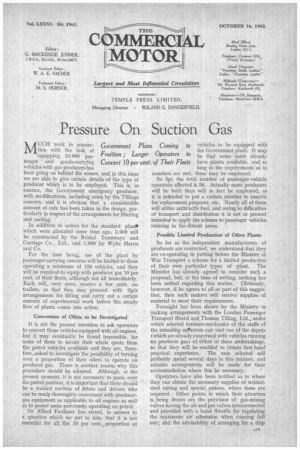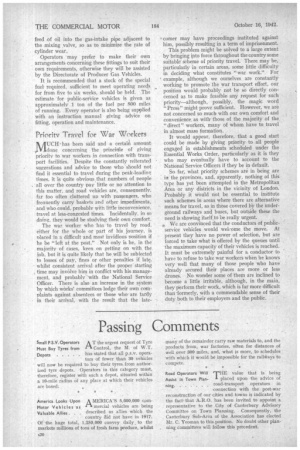Largest and Most Influential Circulation
Page 21

Page 22

If you've noticed an error in this article please click here to report it so we can fix it.
I' ROI' 111 MRS
TEMPLE PRESS LIMITED. Managing Director . ROLAND E. DANGERFIELD.
Pressure On Suction Gas
MUCH work in connec
Government Plans
tion. with the task of equipping 10,000 pasFruition; Larger senger and goods-carrying -Convert 10 per cent. vehicles with gas producers has been going on behind the scenes, and in this is:sue we are able to give certain details of the type of producer which is to be employed. This is, in -essence, the Government emergency producer, with modifications, including some by the Tillings concern, and it is obvious that a considerable amount of care has been .taken in the design, particularly in respect of the arrangements for filtering and cooling.
In addition to orders for the standard plane which were allocated some time ago, 2,000 will be constructed by the Bristol Tramways and Carriage Co., Ltd., and 1,000 by Wylie Harris and Co.
For the time being, use of the plant by passenger-carrying concerns will be limited to those operating a minimum of 150 vehicles, and they will be required to equip with producer gas 10 per cent. of their fleets, although not all immediately. Each will, very soon, receive a few units on trailers, so that they may proceed with trir • arrangements for fitting and carry out a certain amount of experimental work before the, steady flow of plants comes into action.
Conversion of Oilers to be Investigated • It is not the present intention to ask operators to convert those vehicles equipped with oil engines, but it may eventually be found impossible for some of them to secure their whole quota from the petrol vehicles available and they are, therefore, tasked to investigate the possibility of turning over a proportion of their oilers to operate on producer gas. There is another reason why this procedure should be adopted. Although, at the present moment, it is nol necessary to panic over the petrol position, it is important that there should be a trained nucleus of fitters and drivers who can be made thoroughly conversant with producer. gas equipment as applicable to oil engines as well as to power units previously operating on -petrol.
Sir Alfred Faulkner has stated, in answer to a question which we put to him, that it is not essential for all the 10 per cent., proportion of Coming to Vehicles to be equipped with the Government plant. It may Operators to be that some users already of Their Fleets have plants available, and so long as the requirements as to numbers' are met, these may be employed.
So far, the total number of passenger-vehicle operators affected is 56. Actually more producers will be built than will in fact be employed, as it is intended to put a certain number to reserve for replacement purposes, etc. Nearly all of them will utilize anthracite fuel, and owing to difficulties of transport and distribution it is not at present intended to apply the scheme to passenger vehicles running in far-distant areas.
Possible Limited Production of Other Plants So far as the independent manufacturers of producers are concerned, we understand that they are co-operating in putting before the Minister of War Transport a scheme for a limited production of their own particular types of plant. The• Minister has already agreed to consider such a proposal, but, at the time of writing, nothing has been settled regarding this matter. Obviously, however, if he agrees to all or part of this suggestion, then such makers will receive supplies of material to meet their requirements.
Foresight has been shown by the Ministry in making arrangements with the London Passenger Transport Board and Thomas Tilling, Ltd.„ under which selected foremen-mechanics of the staffs of the intending optrators can visit one of the depots (which are already concerned with vehicles running on producer gas) of either of these undertakings, so that they will be -enabled to obtain first-hand practical experience. The men selected will probably spend several days in this manner,. and suitable arrangements will be made for their accommodation where this be necessary.
Operatorshave also been notified as to where they can obtain the necessary supplies of weldedsteel tubing and special pistons, where these are required. Other points to which their attention is .being drawn are the provision of gas-mixing valves having the air and gas valves interconnected and provided with a hand throttle for regulating the maximum air admission when running full out ; alicl the advisability of arranging for a drip feed of oil into the gas-intake pipe adjacent to the mixing valve, so as to minimize the rate of cylinder wear. • Operators may prefer to make their own arrangements concerning these fittings to suit their own requirements, otherwise they will be assisted by the Directorate of Producer Gas Vehicles.
It is recommended that a stock of the special fuel required, sufficient to meet operating needs for from five to six weeks, should be held. The estimate for public-service vehicles is given as approximately 1 ton of the fuel per 800 miles of running. Every operator is also being supplied with an instruction manual giving advice on fitting, operation and maintenance.
Priority Travel for War Workers
jviucH, has been said and a certairi amount done concerning the princinle of giving priority to• war workers in connection with transport facilities. Despite the constantly reiterated suggestions and advice to those who 'should not find it essential to travel during the peak-loading times, it is quite obvious that numbers of people all over the country pay little or no attention to this matter, and road vehicles are, consequently. far too often cluttered up with passengers, who freouently carry baskets and other impedimenta, and who could, probably with little inconvenience. travel at less-congested times. Incidentally, in so doing, they would be studying their own comfort.
The war worker who has to travel by road. either for the whole or part of his journey, is -olaced in a difficult and most invidious nosition if he be "left at the post." Not only is he, in the majority of cases, keen on getting on with the job, but it is quite likely that he will be subiected to losses of pay, fines or other penalties if late. whilst consistent arrival after the proper starting time may involve him in conflict with his management, and probably'with the National Service Officer. There is also an increase in the system by which works' committees lodge their own complaints against absentees or those who are tartly in their arrival, with the result that the late corner may have proceedings instituted against him, possibly resulting in a term of imprisonment.
This problem might be solved to a large extent by bringing into force throughout the country some suitable scheme of priority travel. There may be, particularly in certain areas, some little difficulty in deciding what constitutes "war work." For ' example, although we ourselves are constantly working to promote the war transport effort, our position would probably not be so directly concerned as to make feasible any request for such priority—although, possibly, the magic word "Press" might prove sufficient. However, we are not concerned so much with our own comfort and convenience, as with' those of the majority of the " direct " workers, many of whom have to travel in almost mass formation.
It would appear, therefore, that a good start could be made by giving priority, to all people engaged in establishments scheduled under the Essential Works Order, particularly as it is they who may eventually have to account to the National Service Officers if they be in default. So far, what priority schemes are in being are in the provinces, and, apparently, nothing of this type has yet been attempted in the Metropolitan Area or any districts in the vicinity of London. Probably it would not be essential to institute such schemes in areas where there are alternative means for travel, as in those covered by the underground railways and buses, but outside these the need is showing itself to be really urgent.
• We are convinced that the conductors of publicservice vehicles would welcome the move. At present they hive no power of selection, but are forced to take what is offered by the queues until the maximum capacity of their vehicles is reached. It must be extremely painful for a conductor to have to refuse to take war workers when he knows very well that many of those people who have • already secured their places are more or less • drones. No wonder some of them are inclined to become a little irritable, although, in the main, they perform their work, which is far more difficult than -formerly, with a commendable sense of their duty both to their employers and the public.




























































